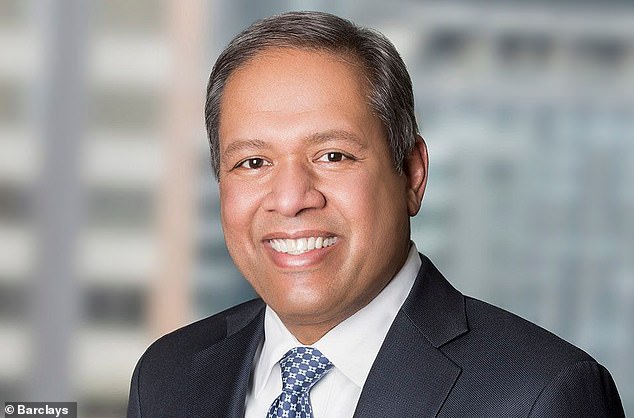Table of Contents
<!–
<!–
<!– <!–
<!–
<!–
<!–
Running an investment bank in parallel with a consumer finance operation is always a big task.
JP Morgan is the example in the United States, but it is not known what is the case with Barclays, which like much of the FTSE 100, suffers from a weak market capitalization.
Chief executive CS Venkatakrishnan, known as Venkat, has been grappling with the issue since taking the helm in November 2021 following the ignominious departure of Jes Staley.
Venkat, like Staley, has a background in investment banking. Personally, he is frustrated that Barclays is failing to get the credit of being the only full-service investment bank in Europe punching above its weight in the City and around the world.
Furthermore, despite all the unwarranted criticism of the poor quality of earnings from bids and deals, debt issuance and trading, it has been an excellent earnings generator for Barclays.

Plan: Barclays boss CS Venkatakrishnan (pictured) aims to use the group’s position as the largest investment bank outside the US, operating in major global financial centres.
At a time when London’s financial sector is seen as having lost its luster, stakeholders should be grateful that Barclays is still standing.
Credit Suisse has collapsed in the largest bank failure since the great financial crisis. Deutsche Bank has suffered years of losses and its reputation as a trustworthy investment bank has been eroded.
Barclays, in Venkat’s words, runs an investment bank that is “globally competitive, the largest and most successful not domiciled in the United States.”
His bold plan is to rebuild trust in a banking brand marred by scandals and CEO changes, and continue to grow investment banking but focus more on everything else Barclays does.
That means a major reorganization, giving greater weight to wealth management (a parallel with Goldman and UBS) as well as retail consumer banking on both sides of the Atlantic. Barclays has a well-known but tarnished brand and Venkat wants to restore its shine.
In an effort to change the bank’s valuation, he proposes selling a complementary payments arm, accelerating cost cuts and rewarding investors. Technology and artificial intelligence make cost reduction more possible.
There is a headline-grabbing promise to return £10bn to shareholders over the next three years, on top of £3bn in recent buybacks.
This has the added benefit of reducing the number of shares outstanding, always useful when there is such a large gap between how the market values a company and the underlying value of its assets.
Way to go.
What recession?
The Opposition’s job is to keep the Government on its toes.
However, one cannot be the only one who thinks that the glee with which Labor pounced on data showing the UK is in a slight technical recession is unseemly, with shadow chancellor Rachel Reeves declaring that The UK is in a “spiral of economic decline”.
It is understood that in an election year this could be considered fair play. But words and headlines have consequences.
Confidence is eroded, consumers do not spend and companies restrict their investment plans.
It is encouraging that Bank of England Governor Andrew Bailey, who a year ago predicted the longest recession in UK history, admitted in testimony to the House of Commons that the slowdown is the shallowest since the 1990s. 1970.
Forecasts from the Office for Budget Responsibility, which will be published alongside the budget on March 6, are expected to show a lively recovery in 2024 and beyond.
The official arbiters of the US recession, the US Bureau of Economic Analysis, only declare such an event when the “depth, spread and duration” of the decline can be demonstrated. QED.
easy kills
As Currys’ largest shareholder, with 14.6 percent of all its funds, Redwheel will have a big say in what becomes of Britain’s last independent electronics retailer.
Supports the board’s decision to firmly reject the first pass from Elliott Advisors (UK).
Redwheel expresses frustration that UK asset managers are choosing to reallocate their holdings to US stocks where valuations are historically high and returns are low.
This leads to a vicious cycle causing depressed valuations on the FTSE 350 and turning the City into a happy hunting ground for foreign predators.
We know that. Redwheel calls for unspecified measures by UK authorities to incentivize investors.
Abolishing stamp duty on share transactions could be a start, but relaxing the tax regime on dividends and capital gains could be a game-changer.
Are you listening, Chancellor?
